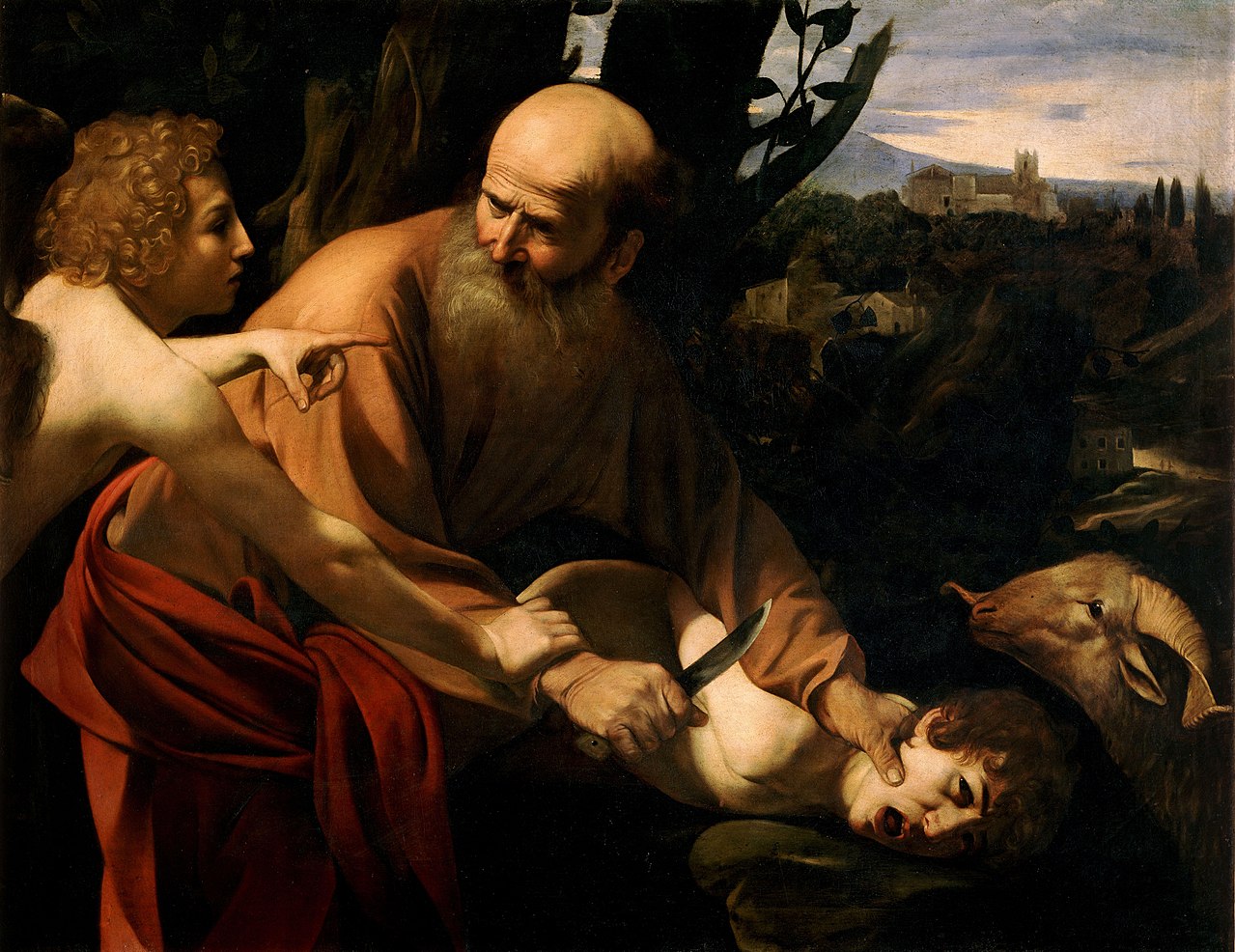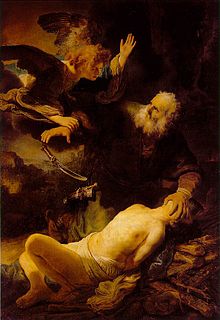
“The ‘Sacrifice of Isaac,’ where God finally said “Stop! Let’s change some ‘traditional values…'”
* * * *
 The readings for June 29, 2014, are Genesis 22:1-14, Psalm 13, Romans 6:12-23, and Matthew 10:40-42. The Genesis story tells of God apparently asking Abraham to kill his son.
The readings for June 29, 2014, are Genesis 22:1-14, Psalm 13, Romans 6:12-23, and Matthew 10:40-42. The Genesis story tells of God apparently asking Abraham to kill his son.
That is, In Genesis 22:1-14, “God tested Abraham,” by appearing to ask him to kill his first-born son Isaac. That was the son – Isaac – that Abraham and his wife Sarah had been waiting and praying for “lo these many years.” (As noted in On “Call me Ishmael” – June 22 Part I, “Abraham was 100 years old when Isaac was born, and Sarah was past 90” when Isaac was born.)
The story bothers a lot of people. That’s because it apparently shows God ordering a father to kill his own son. And that’s the view you would take if you took the lesson literally.
But if you look at some other “prevailing wisdom,” you might get a wholly different take. (See On “originalism,” noting that originalism is the view that interpretation “should be based on what reasonable persons living at the time . . . would have declared the ordinary meaning of the text to be.”) In that view you would ask: What would a reasonable man – under the “community standards” at the time – have thought of Abraham killing his son as a “sacrifice?”
 Apparently it wouldn’t have bothered that “reasonable man” at all. That’s because at that time and place, child sacrifice was quite common. See Binding of Isaac – Wikipedia – illustrated at right – and citing “Hertz:”
Apparently it wouldn’t have bothered that “reasonable man” at all. That’s because at that time and place, child sacrifice was quite common. See Binding of Isaac – Wikipedia – illustrated at right – and citing “Hertz:”
“[C]hild sacrifice was actually “rife among the Semitic peoples. . . [I]n that age, it was astounding that Abraham’s God should have interposed to prevent the sacrifice, not that He should have asked for it.” Hertz interprets the Akedah as demonstrating to the Jews that human sacrifice is abhorrent.
A note: Akedah is Hebrew short-hand for the Abraham-Isaac story, and translates “The Binding.” So to a reasonable Semite at the time – when the story occurred, or when Moses wrote it down, if not both – a father offering his son as a “sacrifice to the gods” was so common that the Akedah proved the noteworthy exception.
So at the time of Abraham, routine child sacrifice was a prevailing “traditional value.”
Which means this story would be something like today’s “man bites dog” journalism. That is, a story about “an unusual, infrequent event is more likely to be reported as news than an ordinary, everyday occurrence.” See Man bites dog (journalism) – Wikipedia.
(Did the Scribe mention that he got a Master’s Degree in Journalism?)
So the Good News is not that God is as cruel as a literal reading of the story would indicate. (I.e., from from a “plain reading.”) The point God wanted to make was just the opposite of what a plain or “literal reading” would show. God wanted to change some of the “prevailing practices” at the time. On that note, the general definition of conservative is of a “person who is averse to change and holds to traditional values and attitudes.”
But in this case, God felt a prevailing practice needed to be changed.
* * * *
Moving on, in Psalm 13, the writer first asked, “How long, O LORD? Will you forget me for ever?” But he ended on a note of hope, “I will sing to the LORD, for he has dealt with me richly; I will praise the Name of the Lord Most High.” (Maybe because God didn’t require child sacrifice.)
In Romans 6:12-23, Paul wrote about the wages of sin; “For the wages of sin is death, but the free gift of God is eternal life in Christ Jesus our Lord.” And the post D-Day and confession addressed this whole business of sin, a “business” that seems to turn off a whole lot of non-Christians. (For example, the search “Christians hung up on sin” led to offerings including Advocatus Atheist: Why are Christians Hung Up on Sin?) Anyway, here’s what “D-Day” said:
When we “sin” we simply fall short of our goals; we “miss the target.” When we “confess,” we simply admit to ourselves how far short of the target we were. And maybe the purpose of all this is not to make people feel guilty all the time, as some seem to imply.
Note also Paul’s saying, in Romans 6:19, “I am speaking in human terms because of your natural limitations.” In other words Paul – like Moses and indeed God Himself – is not limited by his (or His) ability to teach, but only by our ability to comprehend.
So Moses couldn’t tell “the truth” about such things as the earth revolving around the sun, because he had to tell the story of Creation “using language and concepts that his relatively-pea-brained contemporary audience could understand.” See On the readings for June 15 – Part I. So also Paul – like God – had to keep in mind the “natural limitations” of his (His) audience.
And finally, in Matthew 10:40-42, Jesus spoke of the “reward of the righteous.” That especially concerned the children who used to be so routinely offered as a sacrifice to the “old gods” in the time of Abraham. As Jesus said, “Whoever gives even a cup of cold water to one of these little ones in the name of a disciple – truly I tell you, none of these will lose their reward.”
Note the difference – and the improvement – over some “traditional values and attitudes.”
* * * *


“Christ with children by Carl Heinrich Bloch.”
* * * *
The upper image is courtesy of Binding of Isaac – Wikipedia. The full caption reads: “‘The Sacrifice of Isaac’ by Caravaggio, in the Baroque tenebrist manner.” As to the wording of the caption, see “Or words to that effect” – Wiktionary, and also “Or Words to that Effect” – Adoremus Bulletin, quoting the character Richard Rich in the plan “A Man for All Seasons.”
Re: Abraham – Wikipedia. The caption for the image to the left of the lead paragraph is captioned: “Abraham about to sacrifice Isaac. From a 14th-century missal.”
Note also this post was originally published on June 23, 2014, titled, “On the readings for June 29.” I upgraded it, changed the title, added some images and otherwise upgraded it on October 16, 2018.
As to reasonable, see Reasonable person – Wikipedia: “The reasonable person (historically reasonable man) is one of many tools for explaining the law to a jury.”
As to the Hertz reference, “Rabbi Joseph Herman Hertz, CH (September 25, 1872 – January 14, 1946) was a Jewish Hungarian-born rabbi and Bible scholar. He is most notable for holding the position of Chief Rabbi of the United Kingdom from 1913 until his death in 1946, in a period encompassing both world wars and the Holocaust.”
The lower image – and note the contrast between the upper and lower images – is courtesy of The Little Children – Wikipedia.